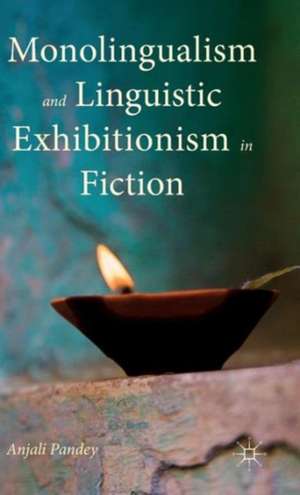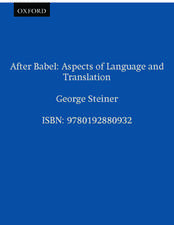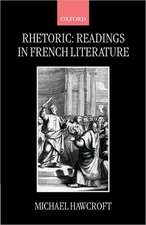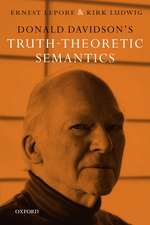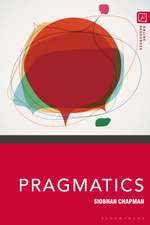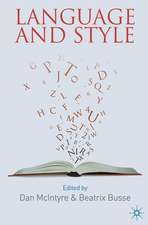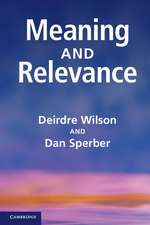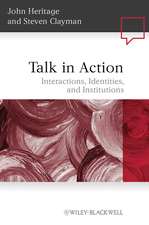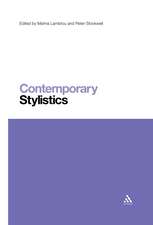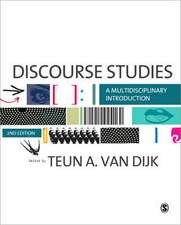Monolingualism and Linguistic Exhibitionism in Fiction
Autor Anjali Pandeyen Limba Engleză Hardback – 9 noi 2015
Preț: 391.99 lei
Nou
Puncte Express: 588
Preț estimativ în valută:
75.01€ • 80.21$ • 62.54£
75.01€ • 80.21$ • 62.54£
Carte tipărită la comandă
Livrare economică 17 aprilie-01 mai
Preluare comenzi: 021 569.72.76
Specificații
ISBN-13: 9781137340351
ISBN-10: 1137340355
Pagini: 302
Ilustrații: X, 302 p.
Dimensiuni: 140 x 216 x 19 mm
Greutate: 0.51 kg
Ediția:1st ed. 2016
Editura: Palgrave Macmillan UK
Colecția Palgrave Macmillan
Locul publicării:London, United Kingdom
ISBN-10: 1137340355
Pagini: 302
Ilustrații: X, 302 p.
Dimensiuni: 140 x 216 x 19 mm
Greutate: 0.51 kg
Ediția:1st ed. 2016
Editura: Palgrave Macmillan UK
Colecția Palgrave Macmillan
Locul publicării:London, United Kingdom
Cuprins
Introduction: Languages in Literature
1. The Place of Languages in the Space of Post-globalism: Bilingualism, Bullhorns and Blunders
2. Award-cultures in the Era of Post-globalization: Prize-winning in a 'Flat'-World
3. In-'visible' Multingualness: Linguistic Exhibitionism in the Post-global Turn
4. Outsourcing English: Liberty, Linguistic Lust, and Loathing In Aravind Adiga's The White Tiger
5. Curried English: Flawed Fluency, Markedness and Diglossia in Brick Lane
6. Language Liquidation versus Language Appropriation: Tracing the Trajectory of Linguistic Death and Unease in Unaccustomed Earth; Jhumpa Lahiri
7. Linguistic Insecurity and Linguistic Imperialism: Resuscitating Renaissance 'Re-Linguiscism' in Salman Rushdie's The Enchantress of Florence
Conclusion: What is Linguistic Exhibitionism Good For?
1. The Place of Languages in the Space of Post-globalism: Bilingualism, Bullhorns and Blunders
2. Award-cultures in the Era of Post-globalization: Prize-winning in a 'Flat'-World
3. In-'visible' Multingualness: Linguistic Exhibitionism in the Post-global Turn
4. Outsourcing English: Liberty, Linguistic Lust, and Loathing In Aravind Adiga's The White Tiger
5. Curried English: Flawed Fluency, Markedness and Diglossia in Brick Lane
6. Language Liquidation versus Language Appropriation: Tracing the Trajectory of Linguistic Death and Unease in Unaccustomed Earth; Jhumpa Lahiri
7. Linguistic Insecurity and Linguistic Imperialism: Resuscitating Renaissance 'Re-Linguiscism' in Salman Rushdie's The Enchantress of Florence
Conclusion: What is Linguistic Exhibitionism Good For?
Recenzii
“Monolingualism and Linguistic Exhibitionism in Fiction is a timely, wide-ranging and thought-provoking work that simultaneously reasserts the power of literature and questions its influence on linguistic diversity and (in)tolerance. Because it reminds its readers of the importance of language difference and multilingualism, it will be of interest to a wide range of students and scholars but … it will mostly appeal to those of applied linguistics, multilingualism, stylistics, postcolonial studies and cultural studies.” (Noémie Nélis, English Text Construction, Vol. 10 (1), 2017)
“Pandey’s book is a timely good read for our post-global literary scene. It is a cogent account of linguistic imbalance in literature, literary capital, and canon formation. Interestingly, the book provides an insight into how scholars with a background in linguistics deal with literarymaterials. … this book can be read as an ardent call for real multilingualism in fiction to help achieve more international communication and a better, symmetrical global interchange.” (Dr. Shadi Neimneh, Arab World English Journal, October, 2016)
“Pandey’s book is a timely good read for our post-global literary scene. It is a cogent account of linguistic imbalance in literature, literary capital, and canon formation. Interestingly, the book provides an insight into how scholars with a background in linguistics deal with literarymaterials. … this book can be read as an ardent call for real multilingualism in fiction to help achieve more international communication and a better, symmetrical global interchange.” (Dr. Shadi Neimneh, Arab World English Journal, October, 2016)
Notă biografică
Anjali Pandey is Professor of Applied Linguistics at Salisbury University, USA. She is a previous winner of the Vogel Award of Teaching Excellence in North Dakota, recipient of the Welcome Fellowship from the Maryland Higher Education Commission, and three-time winner of discretionary language projects for multilingual newcomers from the United States Department of Education.
